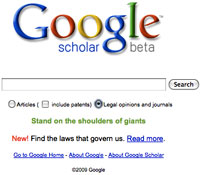BROWSE BY CATEGORY
- Archives and Libraries
- Blogs and Networking
- Bookmark This
- Digital Tools
- Examples of Teaching
- Exhibits
- Film Reviews
- History and Headlines
- Historic Sites and Museums
- Historical Thinking
- Holidays and Heritage
- Issues and Research
- Lesson Plans
- Material and Visual Culture
- Multimedia
- Organizations and Agencies
- Primary Sources
- Professional Development
- Publications
- Student Activities
- Teaching Materials
- Websites
Bookmark This! Google Scholar: Finding the Laws that Govern Us

Now you can find and read full text legal opinions from federal and state district, appellate, and supreme courts at Google Scholar.
Google's announcement of their new feature, Finding the laws that govern us, supports civic awareness and activism. "We think this addition to Google Scholar will empower the average citizen by helping everyone learn more about the laws that govern us all. Laws that you don't know about, you can't follow—or make effective arguments to change," they explain.
To find legal opinions relevant to your curriculum, visit Google Scholar and select the radial button Legal opinions and journals below the search field.
You can search for specific cases or query through topical phrases and refine your results through the Advanced Scholar Search—a detailed filtering questionnaire. (In fact, guiding your students through the advanced search feature may help clarify where legal information is available and the structure of the court system.) Each legal opinion links to related articles and citations. Search results will also lead you to other online repositories that include each cited case.
Interested in reading more about individual Supreme Court Justices, other judges, or attorneys? Search for them by name through this new database, and your results will include articles they've authored, opinions they've rendered throughout their careers on various courts, and cases they've argued.
Google Scholar promotes the accessibility of full-text legal documents with language that encourages their use in the classroom: "Court opinions don't just describe a decision but also present the reasons that support the decision. In doing so, they explain the intricacies of law in the context of real-life situations. And they often do it in language that is surprisingly straightforward . . ."
Their introductory materials point to Korematsu v. United States, in which the Supreme Court justices present a fascinating and easy-to-follow debate on the legality of internment of natural-born citizens based on their ancestry. And in United States v. Ramirez-Lopez, the dissenting judge illustrates the key issue of the case using an imagined good-news/bad-news dialogue between the defendant and his attorney.